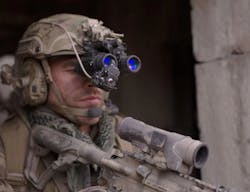Elbit to provide electro-optics night vision goggles that combine infrared and light-amplification sensors
QUANTICO MARINE BASE, Va. – U.S. Marine Corps night vision experts needed an updated helmet-mounted night vision system that combines thermal imaging and light amplification. They found their solution from Elbit Systems of America-Night Vision LLC in Roanoke, Va.
Officials of the Marine Corps Systems Command at Quantico Marine Base, Va., announced a $500 million five-year contract Monday for the Squad Binocular Night Vision Goggle (SBNVG), which enhances the infantry’s lethality and situational awareness at night and in poor visibility.
The military electro-optics contract includes spare and repair parts; contractor logistics support; and test article refurbishment. Elbit prevailed in this SBNVG contract over two other unnamed bidders.
The SBNVG is lightweight and enhances Marines depth perception during maneuvers, Marine Corps officials say. The SBNVG combines longwave infrared thermal imaging with light-amplification technologies. Elbit won a $249 million SBNVG contract in 2019.
The SBNVG is a commercial item purchase that includes a binocular image intensifier night vision goggle with a modular uncooled thermal imaging sensor, a carrying case, a dual-power cable, an associated external power supply, a helmet mounting system, and operator manual.
The optical sensors combines several technologies to enhance the infantry warfighter's capabilities in low-light and degraded-visibility conditions. Light amplification helps illuminate targets at night, thermal imaging enhances vision in smoke and other obscurants, and the binocular design enhance the warfighter's depth perception.
On this contract Elbit will do the work in Roanoke, Va., and should be finished by November 2028. For more information contact Elbit Systems of America online at www.elbitamerica.com/night-vision, or Marine Corps Systems Command at www.marcorsyscom.marines.mil.

